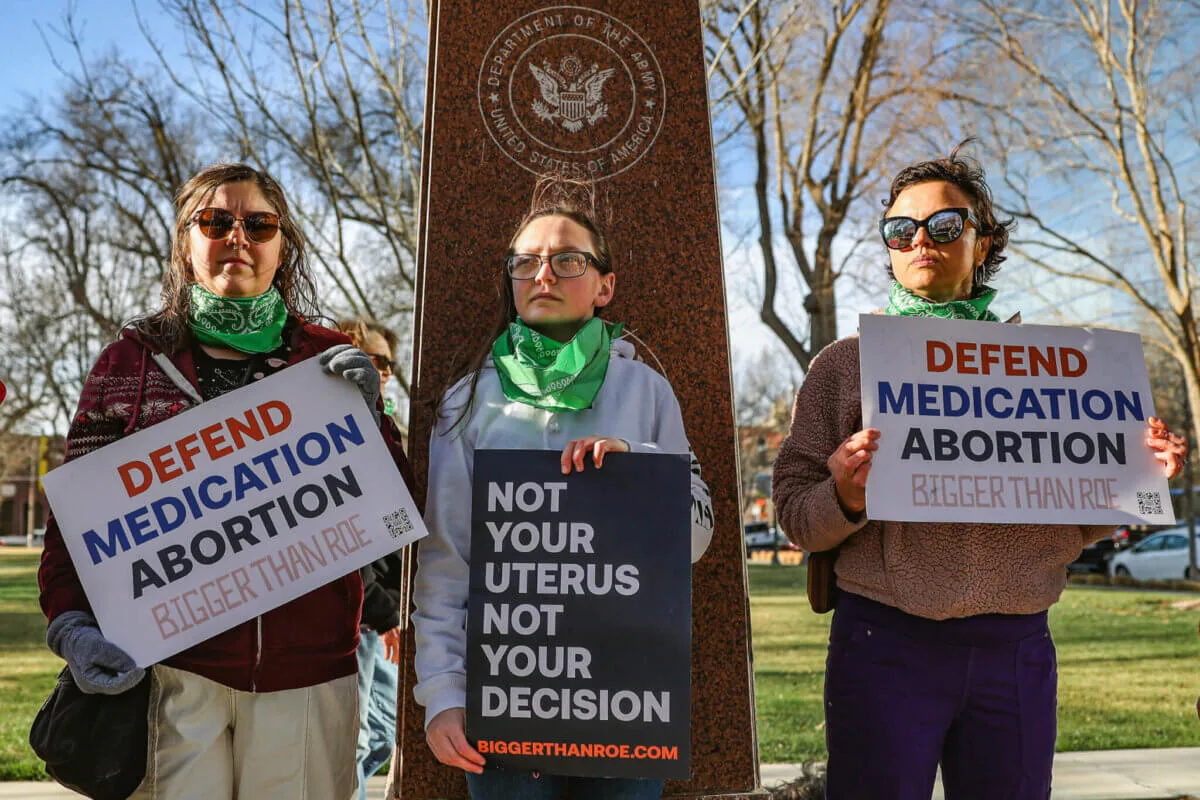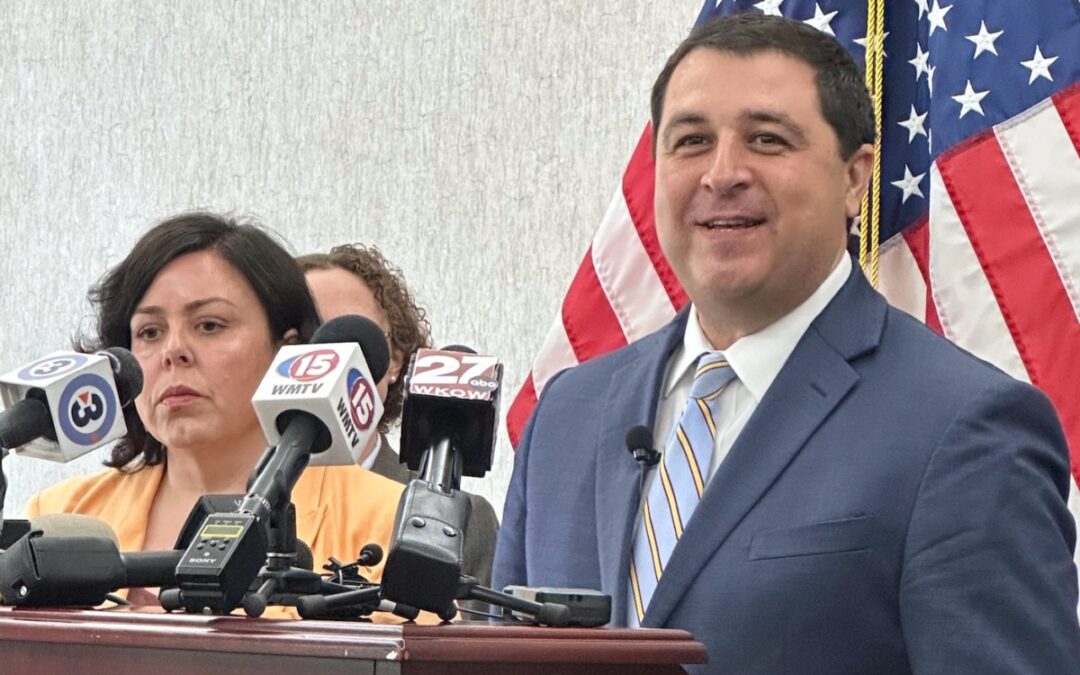
FILE - Three members of the Women's March group protest in support of access to abortion medication outside the Federal Courthouse on Wednesday, March 15, 2023 in Amarillo, Texas. (AP Photo/David Erickson)
UPDATE: Supreme Court Justice Samuel Alito on Friday temporarily delayed Federal Judge Matthew Kacsmaryk’s ruling which sought to suspend the FDA’s approval for the abortion medication mifepristone.
Alito’s ruling means mifepristone remains available according to each state’s abortion laws. The full Supreme Court is expected to rule on whether to uphold or overturn Kacsmaryk’s decision on April 19.
A federal appeals court on Wednesday partially blocked a decision made last week by a judge in Texas that suspended the federal government’s approval of mifepristone, the first of a two-drug regimen used in the majority of abortions in the United States.
The 5th Circuit’s ruling maintains mifepristone’s availability for now, but severely limits access in ways that could harm patients seeking abortion care. It limits the drug’s approved use to the first seven weeks of pregnancy (before many women even know they’re pregnant), prevents the medication from being sent by mail, and requires patients to make three visits to their provider before they can be prescribed the medication.
In effect, the court’s decision allows only the 2000 FDA approval of mifepristone to stand as of April 15, with changes since then being struck down—at least for now.
The Biden administration said Thursday it would immediately ask the Supreme Court to intervene.
“The Justice Department strongly disagrees with the 5th Circuit’s decision,” Attorney General Merrick Garland said in a statement. “We will be seeking emergency relief from the Supreme Court to defend the FDA’s scientific judgment and protect Americans’ access to safe and effective reproductive care.”
Right-Wing Judges Behind the Rulings Are Ignoring Science, Experts Say
The appeals court panel consisted of Judges Andrew Oldham and Kurt Engelhardt, who are both Trump appointees, and Judge Catharina Haynes, an appointee of former President George W. Bush. Their decision overrules the more wide-ranging April 7 decision from US District Judge Matthew Kacsmaryk, also a Trump appointee, who ordered a complete hold of the federal approval of mifepristone, overruling decades of scientific approval precedents and hundreds of studies documenting the drug’s safety in abortion care.
“If it were just up to the science, this case would be thrown out,” Daniel Grossman, an obstetrician and gynecologist who directs a reproductive health research program at the University of California at San Francisco told the Washington Post. “We have over two decades of science showing how safe this is.”
While the 5th Circuit’s decision is marginally less extreme than Kacsmaryk’s, it nonetheless drew widespread criticism from reproductive health advocates, legal experts, and Democrats on Thursday.
“We are furious that yet another court would choose to jeopardize the health and futures of the millions of people who rely on mifepristone for abortion care,” Alexis McGill Johnson, president of the Planned Parenthood Federation of America said in a statement. “This baseless case is a politically motivated attack to further restrict access to abortion that will place care out of reach for patients — and we will not stand for it.”
Why This Case Matters (It’s Not Just About Abortion Rights)
Both health clinics and doctors have said that if mifepristone is pulled from the market, they’ll be forced to prescribe just misoprostol, the second drug in the two-drug regimen, which has a lower rate of effectiveness when prescribed alone. But even restricting mifepristone’s availability to the first seven weeks of pregnancy and making it more difficult for patients to obtain, as the 5th Circuit seeks to do, will make it more difficult for patients in red and blue states alike to access abortion care.
Legal experts have also warned that this case could “upend decades of precedent” and could “set the stage for political groups to overturn other FDA approvals of controversial drugs and vaccines.”
Over 300 biotech and pharmaceutical industry executives, including Pfizer Inc. CEO Albert Bourla, signed an open letter on Monday calling for the reversal of Kacsmaryk’s decision. Plus, Ovid Therapeutics CEO Jeremy Levin told Reuters on Monday that the ruling “is a nightmare scenario” and that “it’s the single worst threat to the industry in over 50 years.”
What’s Next
If the Supreme Court does not intervene, the 5th Circuit’s ruling limiting access to the drug will take effect at the end of this week—an outcome that could pose a threat to tens of millions of Americans with a range of medical conditions.
“The 5th Circuit’s decision—just like the district court’s—second-guesses the agency’s medical experts,” Vice President Kamala Harris said in a statement. “If this decision stands, no medication—from chemotherapy drugs, to asthma medicine, to blood pressure pills, to insulin—would be safe from attacks.”

Meet Milwaukee’s new abortion clinic—and its determined medical director
In this interview, the medical director of Milwaukee’s new, independent, non-profit abortion clinic is referred to as Dr. A for safety reasons. “My...

Wisconsin Ob-Gyn: ‘It’s such a relief! Abortion is legal in Wisconsin.’
Wisconsin's "abortion ban" is no more after the state Supreme Court released a decision Wednesday protecting reproductive freedom. In a 4-3 split...

Trump administration revokes guidance requiring hospitals to provide emergency abortions
WASHINGTON (AP) — The Trump administration announced on Tuesday that it would revoke guidance to the nation's hospitals that directed them to...

Judge who previously fought for abortion rights wants to join Wisconsin Supreme Court
MADISON, Wis. (AP) — A Wisconsin appeals court judge who was an outspoken supporter of abortion rights in the state Legislature announced Tuesday...




